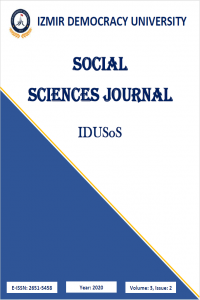KENT YÖNETİMİ: SİMÜLASYONDA İDEAL KENTİ YARATMAK
Son yaşanan depremler sürdürülebilir kentler yaratmanın önemini herkese göstermiştir. Bu çalışmanın amacı, simülasyon uygulamalarının kent yöneticilerinin eğitiminde kullanılmasının potansiyel faydalarını ortaya koymaktır. Yeterli tecrübeye sahip yöneticilerin daha isabetli kararlar verebildiği yönetim biliminde kabul gören bir olgudur. Buna karşın, tecrübe pahalı bir kazanımdır ve eğitim faaliyetleriyle bu maliyetin azaltılması ileride örgütlerde yönetimsel etkinliği artıracaktır. Öte yandan, örneğin pilotların eğitiminde gerçek zamanlı uçuşlar öncesi simülasyon programlarından etkin bir şekilde faydalanılmaktadır. Ancak, genelde sosyal bilimler alanında özelde de yönetim bilimlerinde benzer uygulamalara pek rastlanmamaktadır. Bu nedenle, bu çalışmada gelecekte yerel yönetimlerin önemli kademelerinde çalışması beklenen lisans öğrencilerinin ilgili simülasyon program tecrübelerinin yönetim anlayışlarına katkıları belirlenmiştir.
Anahtar Kelimeler:
SimCity, İdeal kent, Simülasyon oyunu, Kent simülasyonu
URBAN MANAGEMENT: CREATING THE IDEAL CITY IN SIMULATION
Recent earthquakes have shown everyone the significance of creating sustainable cities. This study aims to reveal the potential benefits of the simulation applications' usage in the education of urban managers and local administrators. Experienced managers are more successful in making the right decisions than inexperienced ones. Nonetheless, real-life experience is long and costly as a learning process. Reducing this cost with educational activities would be beneficial for effectiveness in organizations. In line with this, simulation applications have been used effectively in many educational activities, such as the education of pilots before the flights. However, it is hard to find a similar use of simulations in social sciences, especially in administrative sciences. Thus, this study revealed the contributions of simulation software to the administrative experience of undergraduate students expected to work in managerial positions in public organizations and local governments.
___
- Altuntaş, A. (2012). Sürdürülebilir Toplumlar ve Metropollerin Baskılarından Kurtulmak İçin Alternatif Bir Yol: Sürdürülebilir Kentler. Mustafa Kemal Üniversitesi Sosyal Bilimler Enstitüsü Dergisi, 9(17), 135–148.
- Argyris, C. (1957). Personality and Organization: The Conflict between System and Individual. Harper.
- Aslan, M . (2020). Milli gelirin kentleşme ve enerji tüketimi ile ilişkisi: Türkiye örneği. İnsan ve Toplum Bilimleri Araştırmaları Dergisi, 10 (2) , 1493-1517 .
- Buelow, M. T., Okdie, B. M., & Cooper, A. B. (2015). The influence of video games on executive functions in college students. Computers in Human Behavior, 45, 228–234. https://doi.org/10.1016/j.chb.2014.12.029
- Bulkeley, H., & Betsill, M. M. (2005). Rethinking sustainable cities: Multilevel governance and the “urban” politics of climate change. Environmental Politics, 14(1), 42–63. https://doi.org/10.1080/0964401042000310178
- Çetin, H. (2007). Çağdaş Siyasal Akımlar. Orion.
- Çınar, A. K., Ekici, Y., & Baysan, N. (2021). 30 Ekim 2020 Ege Denizi Depreminin Düşündürdükleri. Planlama, 31(1), 4-11.
- Donaldson, S., & Kymlicka, W. (2016). Zoopolis: Hayvan Haklarının Siyasal Kuramı. Koç Üniversitesi Yayınları.
- Durguter, H. (2012). Models of the City and the Sustainable Urban Management. Journal of Turkish Studies, Volume 7 I(7), 1053–1065. https://doi.org/10.7827/turkishstudies.3591
- Fishman, R. (1982). Urban utopias in the twentieth century: Ebenezer Howard, Frank Lloyd Wright, and Le Corbusier. Cambridge, MA: MIT Press.
- Future City. (2018). Future City. http://www.futurecity.nu/
- Gaber, J. (2007). Simulating planning: Sim City as a pedagogical tool. Journal of Planning Education and Research, 27(2), 113–121. https://doi.org/10.1177/0739456X07305791
- Gupta, V. P. (2010). Plato: Who gave us the Republic. Vijay Goel.
- HurriyetDailyNews. (2020, September 12). Generation Z pays more attention to games than real life. https://www.hurriyetdailynews.com/generation-z-pays-more-attention-to-games-than-real-life-158188
- Karaca, C. (2019). Çevre ve Kentleşme Politikası. Ekin.
- Kim, M., & Shin, J. (2016). The Pedagogical Benefits of SimCity in Urban Geography Education. Journal of Geography, 115(2), 39–50. https://doi.org/10.1080/00221341.2015.1061585
- Manocchia, M. (1999). SimCity 2000 software review. Teaching Sociology, 27(2), 212–215.
- Minnery, J., & Searle, G. (2014). Toying with the City? Using the Computer Game SimCityTM4 in Planning Education. In Planning Practice and Research (Vol. 29, Issue 1, pp. 41–55). Taylor & Francis. https://doi.org/10.1080/02697459.2013.829335
- Nemeslaki, A., Molnár, L., & Nemeslaki, T. S. (2019). Application of computer games in public administration: Learning system analysis and technology society politics with Sid Meyer’s Civilization. Central and Eastern European EDem and EGov Days, 285–295. https://doi.org/10.24989/ocg.v335.23
- Norwich, J. J. (2009). The Great Cities in History. Thames & Hudson.
- O’Hagan, F. J. (2007). Robert Owen and the Development of Good Citizenship in 19th Century New Lanark:: Enlightened Reform of Social Control? M. Peters, H. Blee, & A. Britton içinde, Global Citizenship Education (s. 365-379). Amsterdam: Sense.
- Prendeville, S., Cherim, E., & Bocken, N. (2018). Circular Cities: Mapping Six Cities in Transition. Environmental Innovation and Societal Transitions, 26, 171–194. https://doi.org/10.1016/j.eist.2017.03.002
- Reeb-Gruber, S., McCuddy, M. K., Parisot, X., & Rossi, D. (2011). Moving Beyond Teaching and Learning into a Human Development Paradigm. In D. Ifenthaler, J. M. Spector, Kinshuk, P. Isaias, & D. Sampson (Eds.), Multiple Perspectives on Problem Solving and Learning in the Digital Age. Springer-Verlag. https://doi.org/10.1007/978-1-4419-7612-3_16
- Terzano, K., & Morckel, V. (2017). SimCity in the Community Planning Classroom: Effects on Student Knowledge, Interests, and Perceptions of the Discipline of Planning. Journal of Planning Education and Research, 37(1), 95–105. https://doi.org/10.1177/0739456X16628959
- Tóth, E. (2014). Potential of Games in the Field of Urban Planning. In T. Bártek, J. Miškov, & J. Švelch (Eds.), New Perspectives in Game Studies (pp. 71–89). Masaryk University.
- Usatoday. (2020, August 31). No TitleA “real-life Wakanda”: R&B singer Akon moves ahead with “Akon City” in Senegal. https://www.usatoday.com/story/entertainment/celebrities/2020/08/31/akon-moves-ahead-akon-city-senegal-real-life-wakanda/3450779001/
- Wang, S., Li, G., & Fang, C. (2018). Urbanization, economic growth, energy consumption, and CO2 emissions: Empirical evidence from countries with different income levels. Renewable and Sustainable Energy Reviews, 81, 2144-2159.
- Windsor-Liscombe, R. (2006). The Ideal City. In The Ideal City. https://doi.org/10.4324/9780203716656 Woessner, M. (2015). Teaching with simcity: Using sophisticated gaming simulations to teach concepts in introductory American government. PS - Political Science and Politics, 48(2), 358–363. https://doi.org/10.1017/S104909651400211X
- Yıldırım, K. (2022). Sürdürülebilir kentsel politikalara açılan yeni bir pencere: Kentsel dirençlilik. Kent Akademisi , 15 (4) , 1522-1546 . DOI: 10.35674/kent.1009701
- Başlangıç: 2018
- Yayıncı: İzmir Demokrasi Üniversitesi
